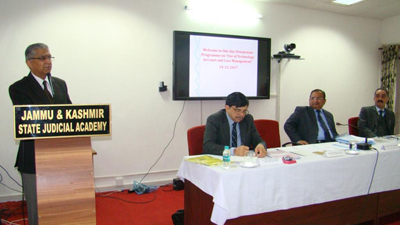Excelsior Correspondent
JAMMU, Dec 24: Chief Justice of J&K High Court Justice Badar Durrez Ahmed today said that his ultimate dream was to ensure digitization of records of the High Court, District Courts and all other courts to save money and time being consumed in shifting the same from one place to another.
Addressing one day orientation programme on “use of technology in court and case management” organized by the State Judicial Academy, Chief Justice said, “we have to achieve the dream of complete paperless courts because the technology doesn’t wait for a judicial system as it moves more rapidly than the judicial system”, adding “if we don’t follow technology we will become completely obsolete. The introduction of court management system and case management system will enable us to overcome the mounting pressure of arrears”.
The Chief Justice, while deliberating upon the importance of technology in the judicial system, said, “my ultimate dream and vision is that all court records whether in the High Court, District Courts, Taluka Courts or any remote corner of the State should be digitized”, adding “all official records are also required to be digitized so that the voluminous records are not required to be moved from one place to another and we can save a lot of money and time”.
Dr Justice S Muralidhar, Senior Judge, Delhi High Court said, “computers and technology are best solutions for all our troubles”, adding “we have to embrace technology as it is an integral part of reforms of justice delivery system”.
“In cyber crimes entire evidence has to be electronic evidence. We have no choice except to adopt the technology just like the doctors perform robotic surgery. A judge should know how emails are generated and how electronic evidence can be collected, examined and relied upon. Tomorrow’s courts are going to be paperless. Every court will be in virtual world”, he further said, adding “the paperless courts are part of ensuring quick and speedy justice”.
Justice Ali Mohammad Magrey, in his special address, highlighted the fruitful results of technology in courts over the years and stated that it has revolutionized the justice delivery system. “There have all along been endeavours at numerous levels world over, in general, and at the national level, in particular, to join heads to evolve and devise some methodologies to achieve the avowed object of delivery of quick, quality and cost effective justice to the litigant public”, he said.
“The information technology has played a vital role in the attempts at achieving that object. Now, the advantages of information technology in our system are not alien to us. However, whereas great leaps have been made in the application and adoption of technology in our systems, many more things may need to be done, especially with a view to ensuring that obsolescence does not creep in the system”, he further said.
Justice Alok Aradhe, Chairman State Judicial Academy gave overview of the training programme and highlighted the achievements of the High Court in e-computerisation and also stated that the regular cause lists as well as the judgements are being uploaded on the official website of High Court for providing case information to advocates and litigants and public in general which facilitates dissemination of information and improves access to justice.
Earlier, Director State Judicial Academy Abdul Rashid Malik delivered introductory remarks.
Shabir Ahmad Malik, Central Project Coordinator, e-Courts, Umesh Sharma, Munsiff, Kiran Koul, Technical Director NIC, High Court along with the NIC team of High Court made a power point presentation on e-mail and SMS as an aid to judicial processes and role of District Computer Committees and Nodal Officers in management of hardware and human resources.


